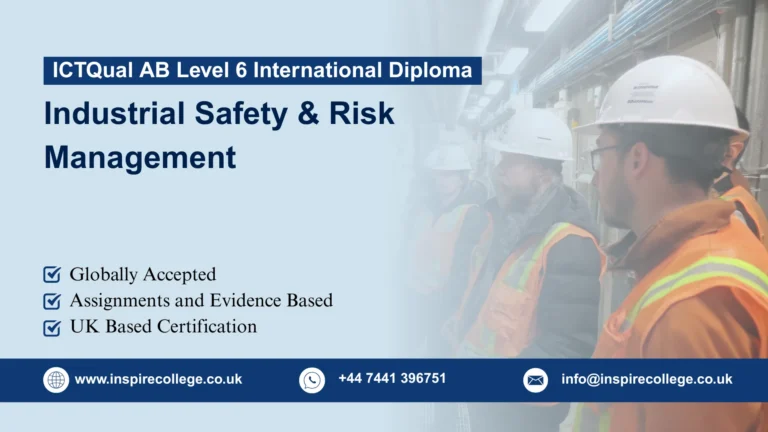
ICTQual ABLevel 6 International Diploma in Power Generation & Distribution
The modern world relies heavily on efficient and reliable power generation and distribution systems, making this sector critical for economic growth, technological advancement, and societal development. The ICTQual AB Level 6 International Diploma in Power Generation & Distribution is designed to equip learners with advanced knowledge, practical skills, and professional competencies necessary to excel in the energy industry.
This three-year, 360-credit programme caters to both fresh learners seeking to build a career in the power sector and experienced professionals aiming to enhance their technical expertise and leadership capabilities. The course offers a comprehensive curriculum covering power generation technologies, electrical distribution systems, grid management, energy efficiency, and renewable integration, ensuring learners gain a holistic understanding of the sector.
Learners will develop practical skills in system design, operation, maintenance, and troubleshooting, as well as proficiency in modern digital tools, simulation software, and control systems used in power generation and distribution. The programme also emphasizes health, safety, environmental compliance, and regulatory standards, preparing graduates to manage complex projects while adhering to international best practices.
Upon successful completion, learners will be equipped to pursue roles in power plants, energy companies, utility providers, engineering consultancies, and regulatory agencies. The diploma fosters capabilities in technical analysis, project management, and strategic decision-making, ensuring graduates are ready to contribute effectively to the evolving energy landscape. This globally recognized qualification provides both theoretical knowledge and applied expertise, empowering learners to become innovators and leaders in power generation and distribution, supporting sustainable and reliable energy delivery worldwide.
To enrol in the ICTQual AB Level 6 International Diploma in Power Generation & Distribution, learners must meet specific criteria to ensure readiness for this advanced programme. These requirements are designed to accommodate both fresh learners and experienced professionals.
Age Requirement
- Learners must be at least 18 years old at the time of enrolment.
Educational Qualifications
- Applicants should hold a Level 5 Diploma, Higher National Diploma (HND), or equivalent in electrical engineering, mechanical engineering, energy systems, or related disciplines.
- Fresh learners with a strong foundation in engineering, technology, or science may also be considered.
Professional Experience (Optional)
- While not mandatory, learners with 1–2 years of relevant experience in power generation, electrical distribution, energy management, or related fields are encouraged to apply to enhance practical understanding.
English Language Proficiency
- Learners must demonstrate proficiency in English through IELTS (5.5 or above), TOEFL, or an equivalent recognised qualification.
- This ensures effective engagement with course materials, assignments, and assessments.
Related Course Option
- Learners interested in broader energy sector expertise may also consider the ICTQual AB Level 6 International Diploma in Renewable Energy, which complements power generation and distribution studies with clean energy technologies.
By meeting these entry requirements, learners will be fully prepared to undertake this three-year, 360-credit programme, gaining the technical knowledge, practical skills, and professional competencies required to excel in power generation, electrical distribution, and energy management roles at both national and international levels.
Mandatory Units
This qualification, the ICTQual ABLevel 6 International Diploma in Power Generation & Distribution, consists of 36 mandatory units.
Year 1 – Foundation in Power Generation & Distribution
- Principles of Electrical Power Systems
- Introduction to Power Generation Technologies
- Fundamentals of Thermal Power Plants
- Basics of Hydroelectric and Renewable Generation
- Electrical Machines and Circuit Theory
- Energy Conversion and Transmission Basics
- Health, Safety, and Environmental Awareness
- Power System Measurement and Instrumentation
- Laboratory Techniques in Electrical Systems
- Technical Report Writing
- Introduction to Power Simulation Software
- Energy Efficiency Fundamentals
Year 2 – Intermediate Power Generation & Distribution
- Advanced Thermal Power Plant Operations
- Renewable Integration in Power Systems
- Electrical Distribution Networks
- Grid Management and Load Analysis
- Power System Protection and Control
- Energy Storage and Backup Systems
- Process Control and Automation in Power Plants
- Energy Management Strategies
- Environmental Compliance and Sustainability in Power
- Quality Control and Assurance in Electrical Systems
- Project Planning and Technical Communication
- Data Analysis for Power Systems
Year 3 – Advanced Power Generation & Distribution
- Advanced Power Plant Optimisation and Troubleshooting
- Project Management in Energy Infrastructure
- Emerging Technologies in Power Generation
- Smart Grid Design and Integration
- Energy Storage Optimisation and Battery Technologies
- Risk Assessment and Hazard Analysis in Power Systems
- Advanced Laboratory Techniques and Field Testing
- Transmission and Distribution Network Planning
- Supply Chain and Logistics in Energy Operations
- Capstone Project in Power Generation & Distribution
- Professional Development and Leadership in Energy
- Strategic Decision-Making in Power Systems
The ICTQual AB Level 6 International Diploma in Power Generation & Distribution is designed to equip learners with advanced technical knowledge, practical skills, and professional competencies required to excel in the global energy sector. Spanning three years (360 credits), the programme ensures learners develop a strong foundation, intermediate expertise, and advanced capabilities across power generation, electrical distribution, and energy management systems. Upon completion of each unit, learners will demonstrate measurable outcomes aligned with industry standards.
Year 1 – Foundation in Power Generation & Distribution
Principles of Electrical Power Systems
- Explain the basic concepts and structure of electrical power systems.
- Analyse the flow of electrical power from generation to consumption.
- Apply fundamental principles to model simple electrical networks.
Introduction to Power Generation Technologies
- Identify different power generation methods including thermal, hydro, and renewable.
- Evaluate the advantages, limitations, and applications of each technology.
- Apply theoretical knowledge to basic generation scenarios.
Fundamentals of Thermal Power Plants
- Describe the operational principles of thermal power plants.
- Analyse energy conversion efficiency and performance metrics.
- Apply safety and operational standards in practical scenarios.
Basics of Hydroelectric and Renewable Generation
- Explain hydropower and renewable energy generation principles.
- Assess site suitability and environmental impacts of renewable projects.
- Apply basic design and operational knowledge to small-scale installations.
Electrical Machines and Circuit Theory
- Understand and analyse the operation of transformers, motors, and generators.
- Solve circuit theory problems using standard methods.
- Apply practical troubleshooting techniques in laboratory settings.
Energy Conversion and Transmission Basics
- Demonstrate understanding of energy conversion processes.
- Analyse basic transmission system parameters and efficiency.
- Apply concepts to simple transmission network designs.
Health, Safety, and Environmental Awareness
- Identify workplace hazards and apply safety procedures.
- Comply with environmental and regulatory standards in energy projects.
- Promote safe operational practices in laboratory and field environments.
Power System Measurement and Instrumentation
- Operate basic instrumentation for monitoring electrical systems.
- Analyse measurement data for performance evaluation.
- Apply instrumentation principles to improve system reliability.
Laboratory Techniques in Electrical Systems
- Conduct experiments to validate theoretical concepts.
- Interpret experimental data and report findings accurately.
- Develop practical troubleshooting and testing skills.
Technical Report Writing
- Prepare structured technical reports on energy projects.
- Communicate data and findings effectively to technical audiences.
- Apply professional standards for documentation and reporting.
Introduction to Power Simulation Software
- Operate basic power system simulation tools.
- Analyse outputs to evaluate system performance.
- Apply software skills to support planning and operational decisions.
Energy Efficiency Fundamentals
- Understand principles of energy efficiency in power systems.
- Analyse methods to reduce losses in generation and distribution.
- Apply efficiency measures in practical scenarios.
Year 2 – Intermediate Power Generation & Distribution
Advanced Thermal Power Plant Operations
- Analyse operational parameters of thermal power plants.
- Apply optimisation techniques to improve plant efficiency.
- Develop practical maintenance and troubleshooting strategies.
Renewable Integration in Power Systems
- Evaluate methods for integrating renewable energy into grids.
- Analyse the impact of intermittent generation on system stability.
- Apply best practices for hybrid energy systems.
Electrical Distribution Networks
- Design and analyse electrical distribution networks.
- Apply load flow and fault analysis techniques.
- Implement practical strategies for efficient distribution.
Grid Management and Load Analysis
- Monitor and control grid operations to ensure stability.
- Analyse load profiles and demand patterns.
- Apply management strategies to optimize network performance.
Power System Protection and Control
- Understand protection schemes for generators, transformers, and networks.
- Analyse system faults and implement corrective actions.
- Apply control strategies to maintain network reliability.
Energy Storage and Backup Systems
- Evaluate different energy storage technologies.
- Apply storage solutions for reliability and peak shaving.
- Analyse performance and lifecycle considerations.
Process Control and Automation in Power Plants
- Implement automation and control techniques for plant efficiency.
- Monitor system processes using digital tools.
- Apply troubleshooting strategies in automated environments.
Energy Management Strategies
- Analyse energy usage and implement management solutions.
- Apply optimization techniques to reduce operational costs.
- Develop sustainable energy strategies for facilities and networks.
Environmental Compliance and Sustainability in Power
- Apply environmental regulations in energy operations.
- Assess sustainability performance of power generation projects.
- Develop mitigation strategies for environmental impacts.
Quality Control and Assurance in Electrical Systems
- Monitor electrical system performance against standards.
- Apply corrective actions to maintain operational quality.
- Implement continuous improvement practices.
Project Planning and Technical Communication
- Develop detailed project plans for energy projects.
- Communicate technical information effectively to stakeholders.
- Collaborate with multidisciplinary teams to achieve project goals.
Data Analysis for Power Systems
- Apply statistical and analytical techniques to operational data.
- Interpret data for decision-making and optimization.
- Use software tools for accurate reporting and visualization.
Year 3 – Advanced Power Generation & Distribution
Advanced Power Plant Optimisation and Troubleshooting
- Evaluate complex power systems for efficiency and reliability.
- Apply advanced troubleshooting techniques for operational issues.
- Develop strategies for system optimization and performance improvement.
Project Management in Energy Infrastructure
- Plan, execute, and monitor energy infrastructure projects.
- Apply budgeting, scheduling, and risk management practices.
- Evaluate project outcomes against objectives and compliance standards.
Emerging Technologies in Power Generation
- Analyse innovations in energy generation and distribution.
- Evaluate potential applications and scalability in the industry.
- Apply emerging technologies to optimize system performance.
Smart Grid Design and Integration
- Develop strategies for smart grid deployment.
- Integrate renewable and conventional sources for grid stability.
- Apply monitoring and control technologies for efficient operation.
Energy Storage Optimisation and Battery Technologies
- Design advanced storage systems for renewable integration.
- Evaluate battery performance, lifecycle, and cost-effectiveness.
- Apply storage solutions to optimize system reliability.
Risk Assessment and Hazard Analysis in Power Systems
- Identify potential risks in generation and distribution networks.
- Apply quantitative and qualitative risk assessment techniques.
- Develop mitigation and emergency response strategies.
Advanced Laboratory Techniques and Field Testing
- Conduct advanced experiments and field tests on power systems.
- Analyse results to validate theoretical and practical concepts.
- Apply findings to improve operational performance.
Transmission and Distribution Network Planning
- Design transmission and distribution networks to meet demand.
- Apply load forecasting, reliability analysis, and network optimization.
- Evaluate environmental and operational constraints in network planning.
Supply Chain and Logistics in Energy Operations
- Manage procurement, transportation, and logistics for power projects.
- Evaluate supply chain efficiency and cost-effectiveness.
- Apply sustainable practices in energy project logistics.
Capstone Project in Power Generation & Distribution
- Integrate knowledge and skills acquired throughout the programme.
- Conduct independent research or practical project in power systems.
- Present professional reports and project demonstrations.
Professional Development and Leadership in Energy
- Develop leadership and management skills in energy contexts.
- Plan career development and professional growth strategies.
- Apply ethical and professional standards in energy operations.
Strategic Decision-Making in Power Systems
- Apply analytical tools for strategic decisions in energy operations.
- Evaluate operational, financial, and environmental outcomes.
- Demonstrate leadership in planning and executing power projects.
Upon completion of the ICTQual AB Level 6 International Diploma in Power Generation & Distribution, learners will have acquired advanced technical knowledge, practical skills, and professional competencies required to excel in power generation, electrical distribution, and energy management roles. Graduates will be fully prepared for leadership and operational positions in energy companies, utilities, engineering consultancies, and regulatory organizations globally.
The ICTQual AB Level 6 International Diploma in Power Generation & Distribution is designed for learners who aspire to advance their careers in the power and energy sector. Ideal candidates are motivated to acquire technical knowledge, practical skills, and professional competencies to contribute effectively to power generation, distribution, and energy management projects.
Learner Profile
- Has a strong interest in power systems, energy technologies, and electrical engineering.
- Is a fresh learner seeking a structured programme to start a career in power generation and distribution.
- Is a working professional aiming to enhance expertise in electrical systems, energy management, and project leadership.
- Possesses a background or foundational knowledge in engineering, energy systems, or related technical fields.
- Is motivated to develop analytical, problem-solving, and technical project management skills relevant to the energy industry.
- Is comfortable using digital tools, simulation software, and laboratory techniques for electrical system analysis and optimization.
- Seeks to understand environmental, regulatory, and safety considerations in power generation and distribution projects.
- Is committed to professional growth and wants to prepare for leadership or strategic roles in energy infrastructure projects.
- Aims to work in power plants, utilities, engineering consultancies, renewable energy firms, or regulatory agencies.
Graduates of this programme will be fully equipped to apply advanced knowledge, practical skills, and professional expertise in designing, managing, and optimizing power generation and distribution systems, supporting sustainable, reliable, and efficient energy delivery globally.
As an approved ICTQual AB Training Centre, learners must enrol with us to undertake the ICTQual AB Level 6 International Diploma in Power Generation & Distribution. The programme offers two certification routes to accommodate both experienced professionals and fresh learners, ensuring flexible access while maintaining international standards.
Certification Route for Experienced Professionals
- Designed for learners with at least 6 years of verifiable professional experience in power generation, electrical distribution, energy management, or related sectors.
- Learners can leverage prior work experience to achieve recognition for practical competencies.
- Experience-based learners are required to complete a reduced number of assessments, focusing on strategic, managerial, and project-based tasks.
- This route is ideal for professionals seeking fast-tracked recognition, while demonstrating advanced knowledge, leadership, and technical expertise in power generation and distribution.
Certification Route for Fresh Learners
- Intended for learners entering the energy sector with little or no prior professional experience.
- Fresh candidates are required to complete all 36 assignbments across the programme to demonstrate mastery of theoretical knowledge, practical skills, and project management competencies.
- This route ensures learners develop comprehensive understanding and hands-on experience in power generation technologies, electrical distribution networks, and energy management systems.
- By completing all assignments, fresh learners will meet the same international standards expected of professional graduates.
By enrolling with our ICTQual AB Approved Training Centre, all learners will receive full access to course materials, expert guidance, and assessment support, ensuring successful completion of the programme. Upon meeting the requirements of their chosen route, learners will be awarded the ICTQual AB Level 6 International Diploma in Power Generation & Distribution, recognized globally for technical excellence and professional competence in the energy sector.
Register Now
FAQs for ICTQual AB Level 6 International Diploma in Power Generation & Distribution






